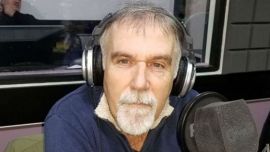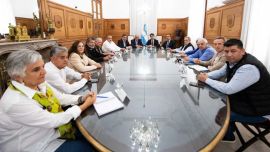The final realisation that we’re caught in a massive typhoon in the middle of the ocean has brought relief to some. The value of the dollar has stabilised around 40 pesos and a lengthy recession is now universally acknowledged as something that could very well extend throughout 2019. President Mauricio Macri announced his intention to run for re-election while in New York last month, doubling down on his economic plan but on steroids, courtesy of the International Monetary Fund (IMF), which had no option but to lend Argentina more money after the recent run consumed practically the entirety of the first disbursement – and former Central Bank governor Luis “Toto” Caputo along the way. The political opposition is logically picking up on Macri’s weakness, and it is now gaining the support of certain sectors of the media which, up until now, had defended the ruling Cambiemos (Let’s Change) coalition blindly. Argentina is indeed staring into the abyss, the omnipresent grieta deeper than ever, with Macri pulled toward extreme liberalism by Christine Lagarde and the so-called ‘rational Peronists’ forcing political gridlock due to their fear of Cristina Fernández de Kirchner.
Politics and economics are deeply related, but operate in different ways. While Macri’s election-winning machine, the PRO party founded alongside Cabinet Chief Marcos Peña, Buenos Aires province Governor María Eugenia Vidal, and City Mayor Horacio Rodríguez Larreta, thrives in moments of deep polarisation — thanks to the communications genius of Ecuadorean adviser Jaime Duran Barba — markets tend toward volatility. Credibility is one of the pillars of both electoral strategy and macroeconomics, yet in this Argentina it acts indifferent ways.
For Macri’s electorate, his decision to request an emergency loan from the IMF and insist on acceler at i ng austerity in order to eliminate the primary deficit by the end of next year increases their attraction to their leader. “We spend more than we make,” they say, “it’s the only way.” For those who believe Macri and everything he represents are the incarnation of all evil, it only strengthens their conviction that he must not be allowed to continue. The fundamentalists among those are begging for Cristina to be a candidate. That’s the perfect scenario for Macri, electorally.
In terms of the underlying financial variables, it puts extreme stress on the whole system. The deep devaluation that has seen the value of the dollar surge from 17 to 42 pesos since last December has brought with it inflation and paralysis. Approved by the Senate on December 27, 2017, the budget for this year projected GDP growth of 3.5 percent, average inflation of 15.7 percent, and a dollar-peso exchange rate of 19.3. The following day, a press conference was called by Peña who, flanked by Caputo and Economy Minister Nicolás Dujovne, humiliated then-Central Bank chief Federico Sturzenegger, telling the nation they were willing to ease inflation targets in exchange for growth. According to a leaked report from the Economy Ministry, 2018 will end with a 2.6-percent contraction in GDP and 42 percent inflation, while Rofex futures put the value of the dollar at 45.05 pesos in January 2019. Instead of growth, they generated stagflation.
The polarisation that has worked so well electorally was proportional to the markets’ loss of confidence in Macri securing his re-election, and therefore executing plans to cut the deficit and reform the Argentine economy. Several prominent businessmen pushed for this currency crisis, indicating a “more competitive” exchange rate would dramatically reduce imports and overseas expenditure — particularly middle-class travel to exotic destinations — dilute the fiscal deficit in dollar terms (and their own peso-denominated debt) and impose the austerity Macri was too timid for, while making Argentine exports more attractive.
What they selectively forgot was that under Macri, Argentina’s foreign-debt surged to US$331 billion by the end of the first quarter of 2018, from US$241 billion by the end of the Kirchner era. The latest available data from the Economy Ministry indicate 70.2 percent of that is in foreign currency, essentially dollars, which more than doubled in value in just 10 months.
Leaving aside for a second the nefarious effects of a recession coupled with high inflation, we’ve also seen the stock of short-term paper issued by the Central Bank balloon to dangerous levels. In their attempts to absorb or sterilise excess pesos being injected into the system by the financing of the deficit with foreign debt, our recent Central Bank presidents turned to Lebacs and then Leliqs. Exchanging pesos for bonds, the Central Bank is now leveraged to the hilt, with some 430 billion pesos in Leliq sitting with banks — paying 73% interest rate as of the latest figures — and will grow to nearly 900 billion pesos, according to some economists, meaning we are extremely vulnerable to anything that rattles investor confidence. Banks are making a killing, just like financial speculators did during the Lebac days through the well-known carry trade, and their shares have rallied aggressively since late August. Global investors are once again recommending Argentine equities.
For everyone but the financial and export sector, things look different. Our purchasing power has been cut in half while costs for goods and services surge. The recession has hit consumption — the main component of GDP — particularly hard, and the world’s highest interest rates mean we live in a credit wasteland, which hurts small and medium-sized business the most. According to the AFIP tax authority, these make up 99 percent of all firms in Argentina. Salaries have logically trailed inflation and unemployment has risen.
Macri’s end goal is indeed the right one: reforming the Argentine economy so as to eliminate distortions such as massive subsidies, rigid labour laws, burdensome red tape, and excessively high taxes, setting the conditions for investment and private sector growth. Invest in energy, particularly the Vaca Muerta shale formation, and empower the agro-exporting sector so as to increase our dollar-generating capacity, eliminating the foreign deficit. And, cut the fiscal deficit, which is one of the root causes of high inflation. The current scenario begs the question as to whether he’ll be able to make it see the benefits of his intended policies. The Peronist opposition isn’t really keen on that either, and the coming Brazilian elections could generate wildly unexpected situations. If closing the grieta converged with the electoral strategy for both Macri and the opposition, then a huge first step would have been taken.



















Comments